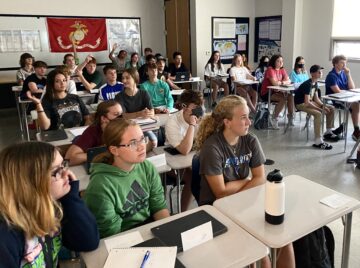AP Boot Camp paves way for freshmen success

Quakertown Community High School freshmen participating in the AP Boot Camp.
The challenging college-level course explains how humans have understood, used, and changed the surface of the earth. Students will use the tools and thinking processes of geographers to examine patterns of human population, migration, and land use.
“The main thing we’re trying to do is prepare students for the challenge that awaits them on August 30th,” said Sean Burke, who teaches the Advanced Placement course. “We’re explaining to them what the course is about and how to be successful.” He said it’s not simply linear history. Instead, it’s thematic, “which is very different from what they’re used to,” he said.
Students attending the Boot Camp will work on strengthening their academic foundations and refining their advanced learning skills. Mr. Burke said the focus will be on team building, time management, AP level reading and note taking skills. “The idea is to prepare them for taking an AP course for the first time in their high school career,” he said.
Mr. Burke also had former students – Riley Mann, Phillip Rotzell and Julia Witte – attend to discuss their experiences in the class a year ago.
“It’s a pretty challenging course for freshmen, but also necessary before taking other advanced classes,” said Riley, who added that going from middle school to high school is “a big leap. Human Geography can be intimidating but I do recommend it because it does tie into everything.”
Phillip said “ it was my most difficult class last year, but also the one that I learned the most.
… It explains the reasons everything happens in the world.”
Superintendent Dr. Bill Harner advocates for students to take advantage of the high school’s 28 diverse AP course offerings. “There is no better way as a new high school student with aspirations to be successful in college than to take AP Human Geography,” he said. “By performing the work to pass the college-level course, students learn the habits necessary to succeed in high school. It also opens up opportunities in college admissions and predictively prepares you to complete your college experience in four years, which only half of America’s students accomplish.”

